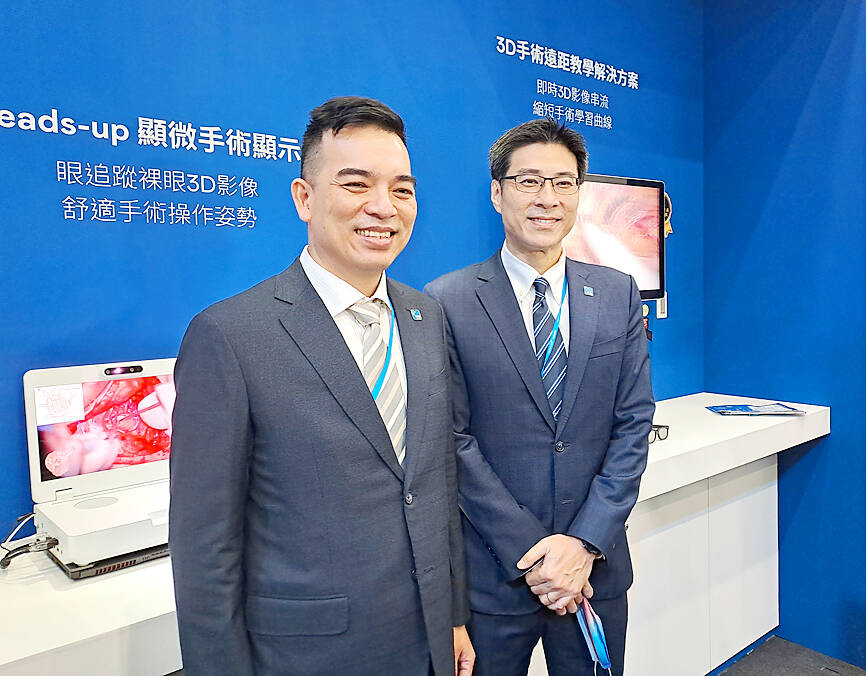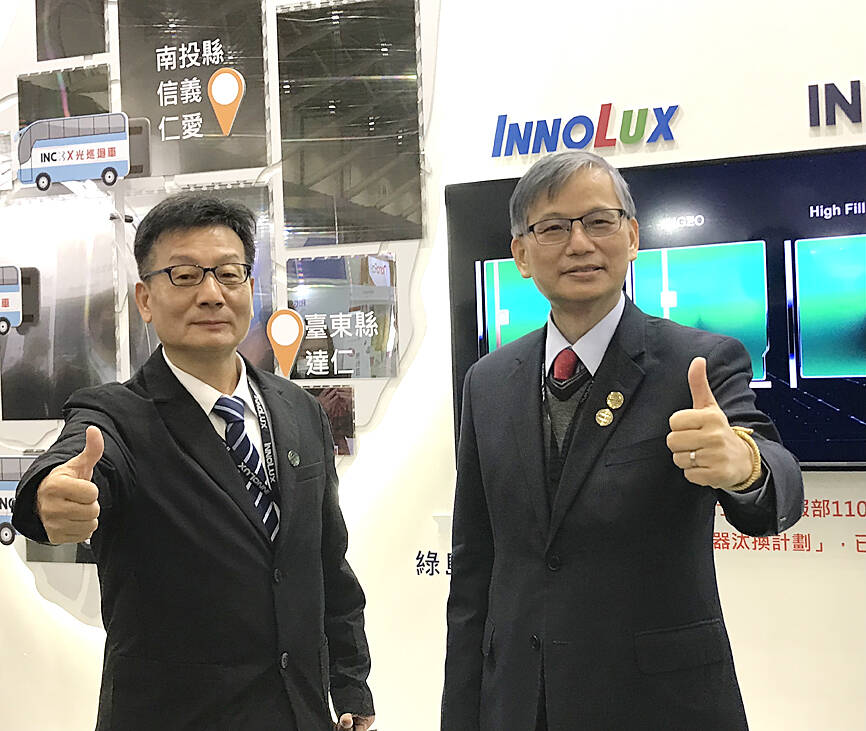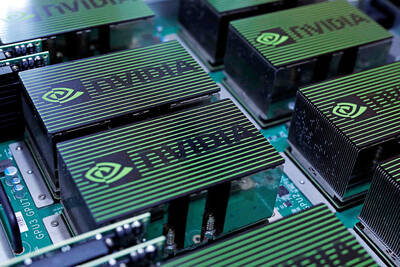Flat-panel makers AUO Corp (友達) and Innolux Corp (群創) yesterday said the display industry remains in the doldrums, although year-end holiday promotion sales have helped drive down supply chain inventory significantly and stimulate new demand.
Despite TV panel prices rebounding for a second straight month last month, unfavorable macroeconomic conditions — including surging inflation and strict COVID-19 curbs in China — continue to weigh on demand, the companies said.
Sell-through figures from the Double 11 holiday fell slightly short of market expectations and were weaker than last year and the year before, as China’s “zero COVID” policy and bad weather in the US depressed demand, AUO president Frank Ko (柯富仁) said.

Photo: CNA
“As most consumer electronics took a hit from the economic uncertainty, the demand for panels remained low,” Ko said. “Channel inventory has only improved lately compared with the same period last year, but the stockpiles of some models remain very high.”
“The first quarter [of next year] will not be better than the first quarter of this year,” Ko said.
It is difficult to predict whether the flat-panel industry would bottom out in the first half of next year, given uncertainty about labor supply during the Lunar New Year holiday and China’s COVID-19 policy, Ko said.

Photo: Chen Mei-ying, Taipei Times
The company will adjust factory utilization in response to market dynamics, he said.
Ko made the remarks on the sidelines of the Healthcare+ Expo Taiwan in Taipei, where AUO Display Plus Corp (達擎), which was spun off from AUO in January last year, showcased a series of displays used in healthcare applications.
AUO Display Plus, which focuses on panels for public displays, industrial devices and smart devices, is expected to contribute about 15 percent to AUO’s total revenue this year, up from 10 percent last year, Ko said.
Compared with AUO’s conservative attitude, Innolux showed a bit more optimism yesterday, saying that Black Friday and Cyber Monday sales mostly matched its expectations, which led to a significant reduction in TV and PC makers’ inventory and bode well for a rebound in demand next quarter.
“Vendors offered deep price cuts of more than 20 percent to clear inventories, and it worked,” Innolux president James Yang (楊柱祥) said at the booth of the company’s medical display subsidiary, InnoCare Optoelectronics Corp (睿生光電).
TV panel display inventory has returned to a healthy level, Yang said.
If the macroeconomy moves in a positive direction, panel prices could continue their uptrend early next year, Yang said.
However, Innolux retained its capacity utilization forecast, with factory usage expected to fall to 70 percent and even 50 percent in the third and fourth quarters.
As demand looks dismal, market researcher TrendForce Crop (集邦科技) analyst Boyce Fan (范博毓) said that in a best-case scenario, local panel makers would have to wait until the second half of next year to see a significant improvement in their bottom lines.

Leading Taiwanese bicycle brands Giant Manufacturing Co (巨大機械) and Merida Industry Co (美利達工業) on Sunday said that they have adopted measures to mitigate the impact of the tariff policies of US President Donald Trump’s administration. The US announced at the beginning of this month that it would impose a 20 percent tariff on imported goods made in Taiwan, effective on Thursday last week. The tariff would be added to other pre-existing most-favored-nation duties and industry-specific trade remedy levy, which would bring the overall tariff on Taiwan-made bicycles to between 25.5 percent and 31 percent. However, Giant did not seem too perturbed by the

AI SERVER DEMAND: ‘Overall industry demand continues to outpace supply and we are expanding capacity to meet it,’ the company’s chief executive officer said Hon Hai Precision Industry Co (鴻海精密) yesterday reported that net profit last quarter rose 27 percent from the same quarter last year on the back of demand for cloud services and high-performance computing products. Net profit surged to NT$44.36 billion (US$1.48 billion) from NT$35.04 billion a year earlier. On a quarterly basis, net profit grew 5 percent from NT$42.1 billion. Earnings per share expanded to NT$3.19 from NT$2.53 a year earlier and NT$3.03 in the first quarter. However, a sharp appreciation of the New Taiwan dollar since early May has weighed on the company’s performance, Hon Hai chief financial officer David Huang (黃德才)

NVIDIA FACTOR: Shipments of AI servers powered by GB300 chips would undergo pilot runs this quarter, with small shipments possibly starting next quarter, it said Quanta Computer Inc (廣達), which supplies artificial intelligence (AI) servers powered by Nvidia Corp chips, yesterday said that AI servers are on track to account for 70 percent of its total server revenue this year, thanks to improved yield rates and a better learning curve for Nvidia’s GB300 chip-based servers. AI servers accounted for more than 60 percent of its total server revenue in the first half of this year, Quanta chief financial officer Elton Yang (楊俊烈) told an online conference. The company’s latest production learning curve of the AI servers powered by Nvidia’s GB200 chips has improved after overcoming key component

UNPRECEDENTED DEAL: The arrangement which also includes AMD risks invalidating the national security rationale for US export controls, an expert said Nvidia Corp and Advanced Micro Devices Inc (AMD) have agreed to pay 15 percent of their revenue from Chinese artificial intelligence (AI) chip sales to the US government in a deal to secure export licenses, an unusual arrangement that might unnerve both US companies and Beijing. Nvidia plans to share 15 percent of the revenue from sales of its H20 AI accelerator in China, a person familiar with the matter said. AMD is to deliver the same share from MI308 revenue, the person added, asking for anonymity to discuss internal deliberations. The arrangement reflects US President Donald Trump’s consistent effort to engineer